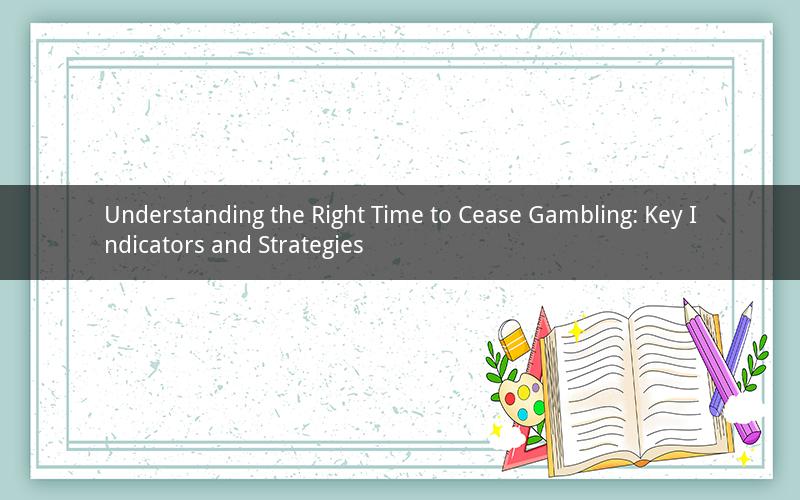
Introduction:
Gambling has long been a popular form of entertainment for many individuals. However, it is crucial to recognize when it has transitioned from a recreational activity to a harmful addiction. Knowing when to stop gambling is essential for maintaining a healthy lifestyle and preventing potential financial and emotional damage. In this article, we will explore the signs that indicate it's time to put an end to gambling and discuss strategies to help you overcome this habit.
1. Recognizing the Signs:
a. Financial Strain: If gambling is causing you to spend money that you cannot afford to lose, it may be time to reconsider your habits. Persistent financial strain, including late payments and accumulating debt, should serve as a red flag.
b. Emotional Distress: Experiencing negative emotions such as anxiety, depression, or guilt due to gambling is a significant indicator that it has become a problem. If these emotions interfere with your daily life and relationships, it's essential to seek help.
c. Time and Energy: If gambling is consuming a significant portion of your time and energy, it may be affecting other important aspects of your life. This includes neglecting work, family, and personal responsibilities.
d. Relationship Issues: Strained relationships with friends, family, or partners due to gambling behavior should not be overlooked. If gambling is causing conflicts and negatively impacting your relationships, it's time to reconsider your priorities.
2. Strategies to Overcome Gambling Addiction:
a. Seek Professional Help: Consulting with a mental health professional, such as a therapist or counselor, can provide you with the necessary guidance and support to overcome gambling addiction. They can help you develop coping mechanisms and strategies to resist the urge to gamble.
b. Set Clear Boundaries: Establishing strict boundaries is crucial in preventing relapse. This may include setting a budget, limiting the amount of time spent gambling, or avoiding certain gambling environments.
c. Develop Alternative Hobbies: Engaging in healthy activities and hobbies can help fill the void left by gambling. This may include exercising, pursuing creative endeavors, or joining social groups.
d. Build a Support System: Surrounding yourself with individuals who support your decision to stop gambling is vital. Seek out support groups, such as Gamblers Anonymous, where you can connect with others who have faced similar challenges.
e. Practice Self-Reflection: Regular self-reflection can help you gain insight into your gambling behavior and identify triggers. By understanding the underlying causes, you can work towards addressing them and reducing the urge to gamble.
3. Legal and Financial Consequences:
a. Legal Repercussions: Engaging in illegal gambling activities can lead to severe legal consequences, including fines, imprisonment, and a criminal record. It is crucial to understand the legal implications of your actions and seek legal advice if needed.
b. Financial Consequences: Accumulating debt due to gambling can have long-term financial implications. It is essential to seek financial counseling and develop a plan to manage and repay any accumulated debt.
4. Long-Term Benefits of Stopping Gambling:
a. Improved Financial Stability: By overcoming gambling addiction, you can regain control over your finances and work towards achieving financial stability.
b. Enhanced Mental Health: Stopping gambling can lead to improved mental health, including reduced anxiety, depression, and guilt.
c. Strengthened Relationships: By addressing your gambling addiction, you can rebuild and strengthen relationships with loved ones, fostering a healthier and more fulfilling social life.
d. Increased Quality of Life: Overcoming gambling addiction can lead to a better overall quality of life, allowing you to focus on personal growth, career, and other meaningful aspects of life.
5. Questions and Answers:
Q1: How can I determine if I have a gambling addiction?
A1: If you are experiencing financial strain, emotional distress, neglecting responsibilities, or strained relationships due to gambling, it is essential to seek professional help and evaluate the extent of your addiction.
Q2: Can I overcome a gambling addiction on my own?
A2: While it is possible to overcome a gambling addiction independently, seeking professional help and joining support groups can significantly increase your chances of success.
Q3: What are the consequences of continuing to gamble despite knowing it is harmful?
A3: Continuing to gamble despite knowing it is harmful can lead to severe financial, legal, and emotional consequences, including debt, legal repercussions, and deteriorating mental and physical health.
Q4: How can I avoid relapse after overcoming a gambling addiction?
A4: To avoid relapse, it is crucial to establish clear boundaries, develop healthy coping mechanisms, surround yourself with a supportive network, and regularly practice self-reflection.
Q5: Is it normal to experience cravings for gambling after overcoming the addiction?
A5: Yes, it is normal to experience cravings for gambling after overcoming the addiction. However, with proper support and strategies, you can manage these cravings and prevent relapse.